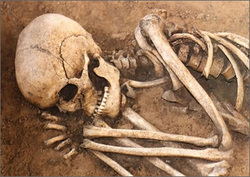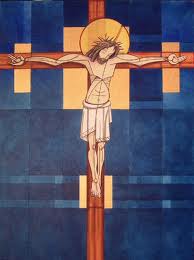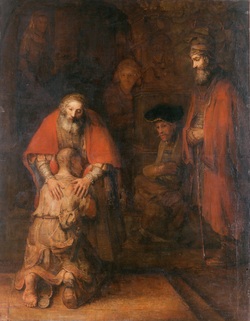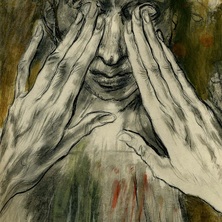 Today's Scripture focus: Ezekiel 37 When my wife and I took our honeymoon, we were living right on the poverty line. I had graduated college and was working three jobs just so that we could pay bills and she could finish her final semester of internship. Therefore, there were no fancy cruises or big trips planned. Instead, we went to Vicksburg, MS and stayed in a bed and breakfast over a long holiday weekend. We visited the Coke museum, the toy museum, ate out, and went to a movie. However, one of the things I really remember was the visit we made to the Vicksburg National Military Park. This park contains 17,077 graves of Civil War soldiers, of which 12,909 are unknown. Row upon row of white tombs stand as a testament to the horrors of war and the death that inevitably follows. I can’t help but picture a scene like this when I read today’s scripture passage. God leads Ezekiel to a valley that is littered with bones, picked clean, and decayed almost to the point of being nothing but dust. We don’t really know what has transpired in this valley. Was there a war? A famine? A drought? A plague? All we know for sure is this: there is no life here, only a monument to death. It seems so appropriate for a season in which we follow Jesus out into the desert of temptation, a season in which we follow the Israelites out into the wilderness of Sin. We enter into the reality of our own valley of dry bones. We look at the mounting casualties of our own war with sin and death. We see what was once our life strewn to and fro across the dry wasteland of temptation, sin, and rebellion. And it is in this situation that we hear the words of God ringing in our ears, “Can these dry bones live again?” It is a great question. In fact, it is the question of our life. In the midst of our failure, is redemption possible? In the midst of our abandonment, is reconciliation possible? In the midst of our pain, is healing possible? In the midst of our death, is new life really possible? Can God really cause these bones to rise again? Can God really really bring good out of tragedy? Can God really breathe life where there is only death? I can do no better than to echo the prophet Ezekiel, “O Lord God, you know.” When I look with my human eyes, I see hopelessness. When I look at my life - all the struggles I have on a daily basis, the ongoing sin, the temptations I give in to day after day, I just want to throw my hands up in the air and give up. I can get so depressed by my own faithlessness that I can’t do anything, much less actually believe that another reality is possible. But then I remember that I can only see things from my own limited perspective. I remember that God has the wide-angle lens to see what is possible with my life (and yours). Ezekiel describes God’s intervention in this helpless situation. He commands the prophet to speak, saying, “Come the four winds, O breath, and breathe on these slain, that they might live.” The word for breath here is ruach, and is the same word used for the Spirit of God. The prophet is saying, “Come, O Spirit of God, from the four corners of the world, from the very edges of creation, and converge in this place. Let the storm of your creation and re-creation descend to bring life where there is no hope of life. Let this dead ground be the fertile soil from which resurrection springs.” As we draw closer and closer to Easter, this story is a reminder that the resurrection is not just about Jesus. We need new life. I need new life. These dry bones are the reality of our life, our very existence (or lack thereof apart from Christ). God wants to do more than rehabilitate our lives. God wants a total renovation. God wants to do more than resuscitate our old bodies. God wants to give us new life. God wants more than revival. God wants re-creation. God wants resurrection. Let it be so, O Lord. Let it be. Prayer: God, I often find myself overwhelmed in my own valley of dry bones. My life lays in ruins and I feel hopeless. Breathe your life into me. Breathe your Spirit into me. Resurrect me and give me new life, I pray. Amen.
1 Comment
 Today's Scripture focus: John 12:20-33 “Tell me the story of Jesus,” I recently asked an adult Sunday School class. Someone chimed in, “We have all sinned and are separated from God. God sent his son Jesus who died for us on the cross to pay the price for our sin. If we believe in Jesus, we will have eternal life with him in heaven.” Not too bad. Sounds pretty familiar. Is that all? Is there more to it than that? Have we gotten so comfortable with our Four Spiritual Laws tracts and John 3:16 signs that there is a whole in our understanding of the gospel. Don’t misunderstand me, I’m not saying that this was not a good explanation. The person who articulated this was echoing what would be known in theological terms as the penal substitutionary theory of atonement (try throwing that around at parties with your friends). Basically it goes something like this: We all have sinned. God is angry at sin. There is a punishment for our sin, which is death. Jesus came to earth. On the cross, God took out the anger and punishment that should have been directed to us on Jesus. As we believe in Jesus, we are forgiven (i.e. our sins are covered). The thing is that, while you can find this understanding clearly articulated in scripture, this is only one understanding of the cross and the issue of atonement. This is not what we find here in today’s passage from John’s Gospel. From the very beginning, we get the idea that John is telling a different story. The other three gospels start with stories about Jesus’ life on earth - Matthew and Luke begin with his birth, while Mark begins with Jesus’ baptism. John, on the other hand, has a much bigger agenda in mind. John starts with “in the beginning. . .” (John 1:1). John is not starting with Jesus’ life on earth. No, John is writing a new Genesis here. John is going all the way back to the beginning. John wants to frame the conversation about a bigger, more powerful, Jesus, who was with God at the creation and who is one with God. Therefore, when John turns his eyes to the cross, he has much more in mind than the forgiveness of individual sins. He has in view something much deeper than a substitutionary atonement through which Jesus takes on divine punishment to relieve us from our guilt. Jesus says, “Now is the judgment of this world; now will the ruler of this world be cast out” (John 12:31). For John, the cross is about divine judgement - not on individuals because of their sin but on “the world” (we should not understand world as all of God’s creation, but as “the fallen realm that exists in estrangement to God and is organized in opposition to God’s purposes” (Charles L. Campbell). Campbell goes on to describe this “world” as a reality outside of humanity. It comprises the institutions that shape human life and seek to hold them captive in destructive, life-taking ways. Therefore, when John says that Jesus has come to bring judgment and cast out the ruler of this world, we are to understand that Jesus has come to perform an exorcism. There is a demon set loose in this world (we know him as the master deceiver, the chief demon, Satan himself). We see the results of Satan, not just in the individual temptations and sin that confront humanity, but in the larger structures that threaten our society - violence, poverty, consumerism, racism, sexism, and any other device that one group uses to dominate another. This run counter to the very heart of God - the desire to bring shalom on the earth - to put everything in its rightful place to exist for the purpose that God created it, not for the way it can be exploited. Jesus has come to call the whole structure into question, to challenge the status quo, to “unmask the powers” (to use Walter Wink’s phrase). But Jesus doesn’t stop at unmasking those powers. Through the cross, Jesus exorcises those powers. Jesus completely defeats those powers once and for all. Jesus begins a new era in the world. A new day has dawned. There is a rightful king . . . and Satan is not it. And the scope of this king’s kingdom is not limited to those who will go to heaven after we all die. No, this whole world has been influenced by a pseudo-king that has done his best to imitate God, but could muster no more than a vague shadow. Jesus’ kingdom includes setting all of creation back on track - to fulfill the purposes for which God has created them. Therefore, as we draw closer to the cross in our Lenten journey and as we meditate today on this text, let us remember that the battle is much larger than our own personal struggle with sin. Let us remember that Jesus’ death accomplished more than my forgiveness. It began the process of setting the entire world straight. It was (and is) the final victory over the ruler of this world. It was (and is) the source of new life and resurrection. He truly was lifted up, so let us trust that we are now in the process of being drawn, along with all creation, to his side where we will worship forever and ever. Amen. Prayer: God, this is about so much more than my personal sin. I confess to you the many ways we have the ruler of this world to distract us and lead us away from your plan for our lives and this world. I confess that I am complicit in this. Forgive me. Open my eyes and let me see the deeper structural sins at work. Give me courage to speak out and address them with boldness and courage. You are the only rightful king. Amen.  Today's Scripture focus: John 11:1-45 I’m a crier. I don’t care if you know that. I don’t care if you think less of me. I don’t think that it makes me any less of a man for admitting that. I cry at movies. I cry when a particular song strikes me. I cry sometimes when I preach. I cry as a result of my deep love for my family. I even cry during those sappy Hallmark commercials that are written to tug on a person’s heart strings. This wasn’t always the case. There was a season in my life that I was extremely emotionally constipated. There was a time when nothing seemed to get through to me. Movies didn’t seem to move me. Music didn’t seem to move me. Relationships weren’t moving me. I became very distant, closed off to those that I cared about the most. My everyday conversation changed as well. I became increasingly sarcastic and cynical (I naturally lean in that direction already). My once witty remarks were becoming more and more biting and hurtful. Finally, a friend of mine confronted me about it. “I don’t know what is going on, but you are not the same person. You are becoming more and more isolated from the people that love you. You are becoming more and more hurtful with your comments. The joy just seems to be sucked out of your life.” I was very appreciative for his courage in coming to me. Ok, well actually I was angry and resentful at the fact that he had come to me, but later I was thankful. The truth is, I had been struggling with one of those deeply imbedded sins in my life. I had not acknowledged just how much I was hurting and just how many casualties I was creating because of my failure to acknowledge that sin and deal with it. The confrontation from my friend was the first step in a process of healing and restoration that I desperately needed in my life. Today’s scripture passage reminded of this incident years ago. It is one of those strange passages in the gospels that I don’t fully understand. Why would Jesus sit around and wait a couple of days while his close friend is dying? Why would Jesus refuse to heal him, even though we’ve seen Jesus heal from a distance before? Why would Jesus take his dear sweet time to get there, arriving four days after Lazarus has been placed in the tomb? Of course, John tips his hand early on in the passage. “This illness does not lead to death. It is for the glory of God, so that the Son of God may be glorified through it,” Jesus says. When Jesus arrives, Martha echoes these same questions when she says, “Lord, if you had been here, my brother would not have died.” Put a little less nicely, she seems to be saying, “If you hadn’t of sat around twiddling your thumbs, my brother wouldn’t have died. I thought he was your friend, Jesus! Thanks for nothing.” Maybe that’s a little harsh, but it’s what I would have said. And then, we have those two little words. They are the shortest verse in scripture - the one we all wanted to be assigned to memorize in Sunday School because we couldn’t possibly mess it up. “Jesus wept.” Jesus wept at this confrontation with death. Jesus wept at this confrontation with the reality of sin. Jesus wept because those that he loved wept. He wept because his friends were suffering. Although Jesus’ power to heal is the main thrust of this passage, healing begins long before Jesus calls out into the darkness of the tomb. Healing begins in those two powerful words - Jesus wept. Healing begins as Jesus enters into the suffering of his people and joins in their tears. He has become one of us and he has offered to shoulder the burden we cannot bear alone. This is true of our Lenten journey as well. As we travel along, we are forced to look into the mirror and confront the fallenness of our own soul. We may very well find that we have become so hardened by our sin that we have lost access to that place in our soul where tears and emotions reside. We may find that, just as tears fail to come, joy is likewise absent. The healing that God desires for us may begin long before we hear the voice of Jesus calling out into the darkness of our soul. That healing may very well begin when Jesus embraces us, places his head on our shoulder, and weeps with us over the reality of our sin. Prayer: God, I acknowledge that the sin in my life has estranged me from the life you have planned for me. My sin has isolated myself from the very emotions that are intended to animate my life. Thank you for joining me in my despair and for taking my burden upon your shoulder. May your tears bring me life and healing. Amen.  Today's Scripture focus: Isaiah 53 I’ve always had this fantasy of being invisible. Maybe it stems from watching Star Trek - I always loved the great Klingon weapon of war: the cloaking device. I remember wishing that I had a cloaking device. I wished that I could hide in plain sight and that no one would even notice that I was there. The reality is that there are people in our world that effectively have a cloaking device on their lives. There are people that get walked by every day and no one seems to notice. I’m thinking about DJ, a young man that lives on the streets of Asheville. He has been in and out of the county jail because there is no room in a hospital detox ward. His 8x8 cell serves as a detox chamber as his body writhes from the heroin that it is craving. Meanwhile his girlfriend and daughter are trying to get enough food to eat and a bed to sleep in while they wait the forty days until his release. I’m thinking of a single mother from Mexico, who is an undocumented worker here in the United States. She came here with her husband, whom she left because of the danger he posed to her and her children. Because she here without papers, her employers constantly take advantage of her. She works seven days a week, with almost no days off whatsoever. She is underpaid and not given credit for the ample amount of overtime she puts in. She is trying her hardest to provide for her children, but is up against obstacle after obstacle. You’ve probably never noticed her because she feels she has to “fly under the radar” or risk being caught by those that deport her and potentially separate her from her children. I’m thinking about a young man who recently gave this country’s continued race problem a name and a face when he was gunned down by a person doing the neighborhood watch program. While all the details are unclear at this point, it seems that he was walking home in an exclusive neighborhood in which his family lived. According to some reports, he was shot because he looked like he might be a threat or up to no good. The fact that we know his name and have seen his face on the news are the exception rather than the rule for this ongoing struggle in our nation’s identity. These are the people that this passage is about. Sure, it is a prophecy that points to the sacrificial death of Jesus, but it is about them as well. It is about those that suffer in silence and obscurity while the rest of us don’t even pay attention. It is about those who, like the scapegoat in Jewish thought, bear the sin of society on their shoulders. They are the ones who suffer so that the rest of us don’t have to. They are some of the victims of a society that would rather sweep them under the rug than reach out and “love our neighbor as ourself.” In Isaiah, the servant doesn’t fight back, but enters into this suffering, injustice, and exploitation with a refusal to fight violence with violence. Instead, the servant fights with an expected weapon: vulnerability. Walter Brueggemann describes the scene in this way: This is a life given for the life of others - no satisfaction of anger, no victory over the power of death, but only a gentle surrogate in punishment. It is as though the vicious cycles must be broken. but they cannot be broken by force, by power, by assertion, for such vigorous assertion only escalates and evokes more from the other side. The servant, this nobody with no resources, breaks the cycles of death and hurt precisely by a life of vulnerability, goes into the violence, and ends its tyranny. Maybe part of our task this Lent is to acknowledge our complicity in the exploitation and violence done against these invisible servants. Now, while I don’t necessarily mean physical violence in every case, it is true that violence is being done in each of these situations. Biblical scholar Raymond Brown has defined violence as “whatever violates another, in the sense of infringing upon or disregarding or abusing or denying that other, whether physical harm is involved or not, can be understood as an act of violence. The basic definition of violence would then become violation of personhood.” From this definition, we can at least acknowledge that we have allowed violence to occur. And for that, we repent. We have allowed people to be invisible. And for that, we repent. We have been blind to their need and deaf to their cries. And for that, we repent. We have profited from their exploitation. And for that, we repent. Let us open our eyes and look for the suffering servants in our midst. Let us look for the new life that God can bring through their sacrifice. Let us reach out and love our neighbor as we love ourself. Prayer: God, open my eyes to the victims of this world’s violence. Help me to see, hear, smell, and touch the servants all around me. They are a picture of Christ, a picture of you. Use them to teach me and make me more like you. Amen.  Today's Scripture focus: John 3:14-21 Sometimes it feels as if life is nothing more than a journey from one crisis to the next. There have definitely been times when this statement has rung true in my extended family. Between financial issues, medical issues, relational struggles, work stress, spiritual dryness, family issues, and so on, the crises had threatened to overwhelm me and made me feel as though I were going under. I tend to be the kind of person that retreats into myself in those times of crises. I want to pull the covers back up over my head. I want to retreat away from the world and from people. I want to hide out in my head until the storm blows over. Spiritual crises seem to be a common theme among many of the great spiritual teachers that I resonate with as well. I can’t help but think of some of the passages from St. John of the Cross in his masterpiece, The Dark Night of the Soul. I think of writings from St. Francis of Assisi, Thomas Merton, Mother Theresa’s recently released letters, Frederich Buechner, Henri Nouwen, etc. All of these writers seem to have had times in their lives where they stared into the deep pit of despair, doubt, loneliness, isolation, and sheer nothingness, hearing only the echo of their own voice reverberate back as they called out for a sign that someone was there. All of these writers, at some point in their journey, reached a place of crisis. They reached a line in the sand where they had to decide if they were going to continue forward or stop journeying all together. This is where Nicodemus finds himself in today’s passage. Literally, these are the words that come from Jesus’ mouth. “haute de estin he krisis,” it says. Which means, “this is the judgement.” The word translated “judgment” is the word krisis, from which we get the English word crisis. Nicodemus has come to Jesus in search of answer. The answer he gets, however, leads to a crisis of faith. Jesus, the light, has come into the world. As the light, he has exposed the darkness of the world. He has unmasked the powers that had hidden behind attractive veils and convincing disguises. He has pulled back the curtain on the seemingly powerful wizard and exposed him for the fraud he really is. The problem is this - people like the wizard. They like to make-believe. They like the darkness. They like to hide and pretend that things really aren’t as bad as everyone is making them out to be. They like to believe that they aren’t really hurting anyone. Nicodemus finds what many of us find: Jesus brings about a crisis. Jesus demands a decision. You’re either in or out. You either follow or walk away. You either step into the light or hide out in the darkness. There is just no room to be neutral when it comes to Jesus. Even no decision is really a decision. Lent has a way of bringing that point of crisis to the forefront. For forty days, we walk in the footsteps of Jesus’ journey in the wilderness and temptation. For forty days, we recall the forty years that the Israelites spent wandering in the desert of their own sin and rebellion. For forty days, we face our own demons as we make our way to the cross. For forty days, the crisis of Jesus calls to us to make a decision - light or darkness? There is good news couched in this language of crisis, however. “For God did not send his Son into world to condemn the world, but in order that the world might be saved through him.” While the coming of Jesus does bring about a sort of judgment, his purpose is not to come as prosecutor or judge. Rather, his purpose is to come as pardoner - to come as the bringer of forgiveness and the agent of reconciliation. He has come to stand in the gap, repairing the breach, paving the way for us to make our way to the Father. He has come to be our light - our beacon, our lighthouse, so that we can find our way back home. Prayer: God, I know that I am at a crossroads. I can choose to move closer to you or to run away. I can choose surrender or rebellion. I can choose life or death. I can choose light or darkness. Help me to choose you, regardless of the path down which that decision may lead me. Jesus, I choose you. Lord, I believe. Help my unbelief. Amen.  Today's Scripture focus: Ephesians 2:1-10 While I’m quite certain that the use of affirmations did not start with 12-Step groups, they have become a powerful tool in fighting addiction. At its most basic level, an affirmation is a declaration that something is true. In dealing with addiction, one of the greatest battles is to distinguish between truth and lie. The inner addict is so powerful in convincing a person to believe the lies of their addiction - lies like, “you can stop anytime you want,” “this will be the last time,” “you deserve a little something for yourself,” or “you’re not hurting anyone else with this behavior.” Addicts have a way of convincing themselves of just about anything and everything. Affirmation are statement that a person knows to be true, regardless of how they feel on any particular day. It is the sober mind putting in writing the truth that an addict wants to remind him/herself when the lies of the addiction are threatening to lead them to compromise. It helps to look in the mirror and say the affirmations to oneself. Hearing them out loud helps to let those truths sink in to one’s life. I have found affirmations to be a powerful tool in my own battle with sin and the “old self.” Jesus said that our enemy is the “father of lies” (John 8:44), seeking to convince us that those lies are truth. A few years ago, my wife compiled a list of affirmations straight from scripture about who God says that I am. While there are many days that I don’t necessarily feel that these are true about me, I try to remind myself that if God has said that they are true, they must be. Since then, I have shared this list with many people struggling with understanding their identity in Christ. I thought of this list as I read today’s passage. It reads very much like an affirmation of our true identity in Jesus Christ. “We were dead in our trespasses,” it tells us. I don’t feel dead, my mind tells me. I’m pretty sure that I’m still breathing, my heart says. I’m still pumping, my heart chimes in. All true, but the reality is that I am dead. Sin is a living, breathing death and I’m a victim of its vile venom. In reality, I don’t have to work really hard to believe this one. I know myself. I know just how many times I blow it each and every day. I realize, as the common prayer of confession used by many different Christian denominations states, that I “have sinned by [my] own fault in thought, word, and deed; by what [I] have done, and by what [I] have left undone.” I know just how bad I’ve screwed things up. This whole Lent process has continually pointed that out to me as well. But it doesn’t end here. “Even when we were dead . . . [God] made us alive together with Christ - by grace you have been saved.” Even when we were dead . . . Even when we had nothing that we could offer . . . Even when we were still enemies . . . Even when all hope seemed lost . . . Even when all others had turned their back on us . . . Even when God should have left us to wallow around in the massive mess we made for ourselves, Christ reached in and pulled us out. No, more than that. Christ took our place. We are already raised up to new life with him. It’s a done deal. It is a fact. New life begins today. And there’s still more. “God . . . raised us up with him and seated us with him in the heavenly places in Christ Jesus.” Not only are we raised to new life, but it is a fact that we are seated with Christ in the heavenly places. It’s as though he wants to be sure that we are sure to get it - it’s not just new life, you are royalty in Christ Jesus. In those days that you look in the mirror and can only see your sin and failure staring back at you, remember that you are a prince/princess. You are a child of the king. You are seated in the place of honor among the royal court. It is a fact. This is an affirmation, if ever I heard one! This is something we need to be reminded. This is not a future hope, but a present reality. This is not something we’ve earned, it is a gift. And should you ask why? Why has God met you in Jesus at the lowest point of your life? Why has God breathed new life into your bones? Why has God seated you among the royal court in the heavenly places? “We are his workmanship, created in christ Jesus for good works, which God prepared beforehand, that we should walk in them.” This is your identity. This is your life purpose. Go live it. Prayer: God, that you for the reality of who I am in you. Thank you for new life. Thank you for forgiveness. Thank you for adopting me. Thank you for making me an heir to the throne. Thank you for giving me a purpose. Help me to live into this reality and reject the multitude of lies this world would have me believe. Amen.  Today's Scripture focus: Luke 15:11-32 It is always dangerous when we come across passages in the Bible with which we are extremely familiar. The so-called “Parable of the Prodigal Son” is just one such passage. The prodigal son has become somewhat of a folk-hero in our culture. We’ve all heard the stories of the young son or daughter who sets out on their own to “sow their wild oats,” only to come home later all grown up and having finally made something of themselves. Or maybe it doesn’t turn out quite so neatly and they come home after hitting rock bottom and having nowhere left to turn. It is a story that it told over and over again in our cultural conscience. A couple of years ago, I spent a lot of time studying, meditating, and teaching through this famous parable of Jesus. I came to the conclusion that calling this a parable of “the prodigal” was probably an accurate moniker. However, just which prodigal are we talking about? It seems to me that there are multiple candidates to carry this title. A quick dictionary definition of the term prodigal lends the following results: Prodigal (adj). 1. Rashly or wastefully extravagant 2. Giving or given in abundance; lavish or profuse With that in mind, let me tell you a little about a family I call “The Prodigals.” The Younger Prodigal. This seems to be the most obvious choice to wear the label. You can’t really get around the fact that this is a real jerk. When he comes to his father to ask for his share of the inheritance, he is essentially saying to his dad, “I wish you were already dead.” Surprisingly, the father gives it to him and he takes his inheritance and wastes it in “reckless living.” Things get so bad that the young man ends up tending the pigs of a Gentile - a double no, no (working for a Gentile and touching such an unclean animal). He is at rock bottom when he comes to himself. He has squandered everything that his family has worked hard to earn and has essentially flushed it down the drain. The Prodigal Father. Let me say that if one of my sons came to me and said essentially, “Dad, I wish you were dead. Give me my money now,” I don’t think I would have had the same reaction as this father. I think it would have been something more along the lines of, “You ungrateful little . . . How dare you come to me and ask for your inheritance now!” But he does. And when that son hits the bottom and drags himself home, I’m not so sure that I would be pulling out a new robe, a new ring, and throwing a party for him. How is that going to teach him the consequences of his actions? Yes, this father is prodigal in his love for his son, going way over the top time and time again. The Older Prodigal. In reality, this is the one I identify with the most. The responsible child who does what he is supposed to do. He works hard, keeps the family business going, works the fields, and doesn’t cause his father any trouble. I wonder about this brother’s reaction to his brother’s request. Did he object? Did he try to talk his father out of it? And when his brother comes home, having wasted all that he had worked so hard to earn, the older brother is furious. “You’re throwing him a party? A robe, ring, and calf? I’ve never even gotten a goat to have a party with my friends!” This elder brother has been just as prodigal with his father’s love as his brother has, but in a different way. Instead of wasting it on reckless living, he has wasted it on resentful living. He has wasted his fathers love thinking that he has to earn it, to slave away at doing the right thing, the expected thing. He has become a slave instead of a son. The Prodigal God. The deeper reality of this story is that it is a story of God and God’s chosen people. In this simple story, Jesus is essentially retelling the story of the Israelites, a people who have continually wandered away from God and wasted the rich blessings God has given them. The history of the Israelite people is a history of exile and return - of running away from God, hitting rock bottom, and returning once again. It is a story of a God who has been prodigal with his love towards this chosen people - a God who will be true to the covenant God has made. The New Testament scholar, N.T. Wright put it this way: “Exile, as some of the greatest prophets had seen, was itself part of the strange covenant purposes of Israel’s father-god. Israel could be allowed to sin, to follow pagan idolatry, even to end up feeding the pigs for a pagan master, but Israel could not fall out of the covenant purposes of her god. She could say to her god, ‘I wish you were dead’, but this god would not respond in kind. When, therefore, Israel comes to her senses, and returns with all her heart, there is an astonishing, prodigal, lavish welcome waiting for her.” (N. T. Wright, Jesus and the Victory of God, p.129) You see, this is a story about God, who is lavish in loves towards us. So, regardless of where we find ourself in the story - the younger prodigal who has run away from home and wasted the father’s love in wild living, the older prodigal who has stayed home and wasted the father’s love in resentful, or you are the father who has given over and over again (only to be taken advantage), there is good news: God is faithful. Healing is available. Come home now, the banquet is just getting started. Prayer: God, I am a member of The Prodigals. I know that I most closely identify with the (younger/older/father). I need to feel your covenant love surrounding me and beginning the work of healing in my life. May your prodigal love always surround me. Amen.  Today's Scripture focus: John 6:22-59 Sometimes a pastor needs a place where he/she can go that he/she is not always “on.” For the most part, there is no place that I go on a regular basis that I’m not expected to be a “pastor,” with all the baggage that comes with that. On a certain level, I understand that and embrace that calling, but I have to admit that there are days that I’m weary and in need of a sanctuary - a space where no one is looking to me to minister to needs, a space where someone else can minister to my needs. Most recently, I have found just such a place on Wednesday mornings at a local Episcopalian Congregation in town. In fact, the Wednesday morning mass has become the “ecumenical pastors” mass as half of the congregants are pastors of other congregations - none of them Episcopalian (it sounds better to say “half” rather than 3-4, but since that really is half of the small group, I guess it’s not stretching the truth or trying to be misleading). I come from a United Methodist upbringing and serve in a Baptist church, so the chance to enter into a sacramental tradition once a week is very refreshing. Whereas the centerpiece of the services at my congregation is the sermon, sacramental traditions emphasize the sharing of the eucharist (Communion or Lord’s Supper) as the centerpiece of corporate worship. The highlight of the 30-minute service on Wednesday mornings is all of us gathering around the altar on our knees and hearing the priest say, “The Body of Christ, the bread of heaven. The Blood of Christ, the cup of salvation.” It is interesting that the Gospel of John is the only Gospel that doesn’t include what is commonly known as the “Last Supper.” While it does talk of a meal, the emphasis is placed on Jesus washing the feet of the disciples, not in the meal that they share together. Instead, today’s passage is the closest thing we get in John’s Gospel to some form form of description of the Eucharist. It is clear from the passage that many of Jesus’ hearers found this teaching to be very difficult to accept. While we take all of this talk metaphorically, it is likely that those first hearers took Jesus very literally. You can imagine the conversations that must have taken place among those in the crowd. “Did he say that he wants us to eat his flesh and drink his blood? Gross! We know that is against the law.” I can’t help but think about those times that I gather with a community of believers around the table to partake of this holy meal. The amazing thing about that meal is that it is a great equalizer. It doesn’t matter what your status in life - rich, poor, CEO, jobless, gated community, or homeless - you are welcome at God’s table. The features that seem to define you in a social context in the world don’t apply here - race, gender, body type or shape, ability or disability - you are welcome at this meal. We gather because Jesus has called us together into this rich, diverse counter-cultural community of faith. We gather, knowing that we are all sinners in need of grace and nourishment from the broken body and shed blood of Jesus. This is what draws me into this wonderful mystery. This is what makes remembering the Eucharist so life-giving. First, it is Jesus who is giving this meal. Jesus s the host who has called us to join him at the table. Jesus is the one who has prepared a place for us. Second, it is Jesus who is given in this meal. It is from Jesus that we receive nourishment. It is Jesus that gives life. We are drawn into a deeper, more intimate relationship with Jesus through this remembrance. If we have any hope for any true healing this Lenten season, it will come only as we deepen on connection to, and dependence on Jesus, the Christ who nourishes us with his body and blood. Prayer: God, I accept your invitation to the table. I find my nourishment in you. Draw me closer to your heart and bring me healing through your sacrifice and the radical, inclusive community that is formed and nourished as a result.  Today's Scripture focus: John 9:1-38 One of the earliest fears that I clearly remember was the fear of thunderstorms. It wasn’t the wind or rain, or even the lightening really. It was the thunder that sent me diving under the covers and burying my head under the pillow, though. Every single time that I saw the lightening flash, I would curl up into a ball, every muscle in my body would tense, and I would wait for the sound that would rattle my windows and threaten to crash everything in my little world - or so I thought. It’s funny because now I love thunder storms. On the surface, it is true that this is a passage about healing - about a man who had spent his whole life unable to see the beauty of the world God created and how he gained his sight. It is about Jesus being glorified through this man’s healing. Isn’t this the hope of Lent? Isn’t this the best-case-scenario for our forty days of fasting, confession, and repentance? Out hope and prayer is that these practices will lead to the center of God’s heart where we can find healing. Maybe it’s healing of the body, but maybe not. It couldn’t be healing of the mind, of the emotions, of the guilt and shame that weighs us down on our daily journey. However, fear seems to play a prominent role in today’s scripture passage as well. I am convinced that fear is the primary reason that many people don’t experience the healing that God wants to give. The people of the community struggled to share in the man’s healing because they weren’t even sure it’s him. “Is this the guy who who used to sit at the gate and beg?” Too often, we define others by their differences from us. For this guy, they seem to not be able to recognize him without the blindness that had defined him his whole life. they weren’t able to share in the joy of his healing because they hadn’t gotten past physical difference to really get to know him on a deeper level. Even the disciples wanted to define the man, not exactly by the blindness, but the sin that must have obvious caused it. Jesus plainly tells them, “You’re missing the point altogether. This man is the way he is, not due to sin, but so that God’s glory may be revealed in him. He is created in the image of God and God will shine through him so that all the world may see” (my paraphrase). It’s even possible that the man could only define himself by means of his blindness. We need look no further than the story of the beside the pool at Bethesda in John 5. “Do you want to be healed?” Jesus asks the man. I know many people who have become so enmeshed with life as they know it, that they have defined themselves by their illness, their circumstances, their addictions, or their sin. they cannot imagine an existence different from the one that stares them in the mirror each morning. “Do you really want to get well?” Jesus asks them. But often, fear keeps them from being healed or experiences another’s healing. The same goes for the religious leaders in today’s passage. They cannot experience the joy of this man’s healing because it threatens their ability to control the story of God. They cannot believe this man’s story because it contradicts the story they are trying to tell. This Jesus cannot be from God because he breaks the law by healing on the Sabbath. This man is not a hero, he is a sinner. They see their power and their authority at stake and seek to remain in control of the religious goods and services of the community. Even the man’s parents struggle with fear in the face of their son’s healing. They pass the buck, refusing to testify in their son’s defense because, as the scripture says, “they feared the Jews, for the Jews had already said that if anyone should confess Jesus to be Christ, he was to be put out of the synagogue.” They cannot enter into the joy of their son’s healing because of fear. As we continue in this journey through Lent, we need to be reminded that fasting, denial, ashes, confession, repentance, and so on are not the goal. Rather, they are a means to an end. The goal of Lent is to enter into Jesus’ death, so that we might experience Jesus’ life. The goal is healing. We need to stop, however, and ask ourselves a long, hard question: “Do you want to be healed?” Are we afraid of healing? Are we afraid of what it might mean for our lives to die to that old self, to leave behind the sins and addictions and illnesses that once defined us? While it seems like it should be, it’s not an easy decision. We have to let go of the very things that used to define to take on our new identity as children of God, followers of the Christ, those that have died and have been born again, those that have been healed. “Do you really want to be healed?” Prayer: God, help me to see to see the healing that you alone offer. Help me to find my identity in who you say that I am rather than through the imperfections, struggles, addictions, and circumstances of my present life. Help me to lay it all down to follow you. Amen.  Today's Scripture focus: Psalm 51 I grew up an avid fan of superheroes. Superman, Batman, Spiderman, Green Lantern, Aquaman, Ironman, the Hulk, Captain America, The Flash, X-Men, The Fantastic Four . . . well, you get the picture. As you can imagine, I've been very interested in all the different movies that have been coming out in the past few years, bringing my childhood heroes to the big screen. I have a theory about the reasons behind the surge of these franchises and the relaunching of others. I think that a lot of the guys in my generation have grown up on computers and have become very good with special effects. They look at the ways their heroes have been portrayed and think, "I could do better than that." And so they try. Now, I will admit that some have been more successful than others. While I have really enjoyed the way some of the more recent movies have sought to be more true to the original characters than previous movies, I can't help but think that some of these films are a special effects extravaganza in search of a plot. In some cases, the Hollywood portrayals have expanded way beyond my own limited imaginings, but this is not usually the case. Usually, the world that I had come up with in my head was much more interesting. I had a conversation very similar to this recently with a friend of mine. We were talking about a certain series of books that is being made into a hollywood movie. He stated that he was having a hard time getting excited about the movie and was unsure that he would even go see it. "I think it will be done well," he said. "I just don't think they will be able to outdo the image I have in my head. It will probably ruin it for me." Many have said the same thing about such classics as the Chronicles of Narnia or the Lord of the Rings. While the movies were well-done, it just could never top the amazing world Tolkien or Lewis evoke in the mind with their wonderful prose. "What does this have to do with Lent or, more specifically, Psalm 51" you may be thinking. Psalm 51 is a prayer of repentance. Traditionally, it is understood to be the prayer of King David after he has been visited by the prophet Samuel and outed as an adulterer and murderer. Before we can ever come before God in true confession and repentance, and before we can ever truly experience forgiveness, it is imperative that we think deeply about how we image or picture this God to whom we pray. As Brennan Manning puts it so well, "It is always true to some extent that we make our images of God. It is even truer that our image of God makes us. Eventually we become like the God we image" (The Relentless Tenderness of Jesus, p. 29). The writer of this Psalm gives us some clear indications of his Imago Dei (image of God) through his prayer. Have mercy on me. The first assumption is that God is merciful. "What has the Lord required of you?" the prophet Micah asks. "Do justice, love mercy, and walk humbly with your God" (Micah 6:8). In the book of James, we read that "Mercy triumphs over judgment!" (James 2:13). The God we come to in repentance is a God that repeatedly shows mercy - not giving us what we deserve, but giving us second, third, fourth, and fifth chances. In fact, God seems to specialize in giving us exactly what we don't deserve: mercy and grace. According to Your steadfast love. This term "steadfast love" is greatly misunderstood. In most modern Western cultures, we think of love as an emotion - as something that you feel. The psalmist is not appealing to God on account of God's emotions towards us, however. Rather, the Hebrew term here (hesed) implies something much deeper than emotional fondness. Hesed refers to God's covenant faithfulness to God's people, God's loyalty to the covenant God has made. In essence, he is praying, "Be true to your word, God. Be true to your commitment to your people." Blot out my transgressions. Before we can truly come to God to ask forgiveness, we must believe that God will actually forgive us. We must believe that forgiveness is possible. When we read statements like "as far as the east is from the west, so far has God removed our sin from us" (Psalm 103:12), it is not just good poetry. This is truth of who God is - a God of forgiveness. Look how many people in the scripture are incredibly flawed - Moses (murderer), David (adulterer/murderer), Rahab (prostitute), Tamar (incest), Paul (terrorist) - the list could go on and on, but God chooses to use them in spite of this. God chooses to offer forgiveness over and over again. Any judgment that God doles out comes only after chance after chance after chance or for forgiveness and repentance. Ultimately, God is not pictured as some cosmic schoolmaster, sitting up in heaven waiting for you to get out of line so that God can smack your hand with a ruler. God is not so angry over your screw ups and failures that God us fuming up in heaven, just waiting for a chance to pour out some of that wrath on humanity. God is not pictured as a resentful father, up in heaven keeping track of all the different times and ways that you've messed things up so he can throw it in your face when the time comes. Instead, the psalmist goes to this merciful, loving, loyal, forgiving God to lay his heart bare and confess that his actions have alienated him in his relationship to God. This is the God we approach in confession and repentance this Lent. This is the God to whom we need to be reconciled. Prayer: God, I come to you in need of your mercy, love, and forgiveness. I have run away from you and violated our relationship time and again. In my sin, I violated relationships with your people - those you have created in your image. I confess these sins and ask you to forgive me. I need your reconciliation. I need your healing. Amen. |
Ecclesia Writer's ConsortiumWe are blessed at Ecclesia to have a number of gifted writers and teachers. Here, you'll find devotions, meditations, and musings from a sample of those writers. Archives
June 2015
Categories
All
|
 RSS Feed
RSS Feed